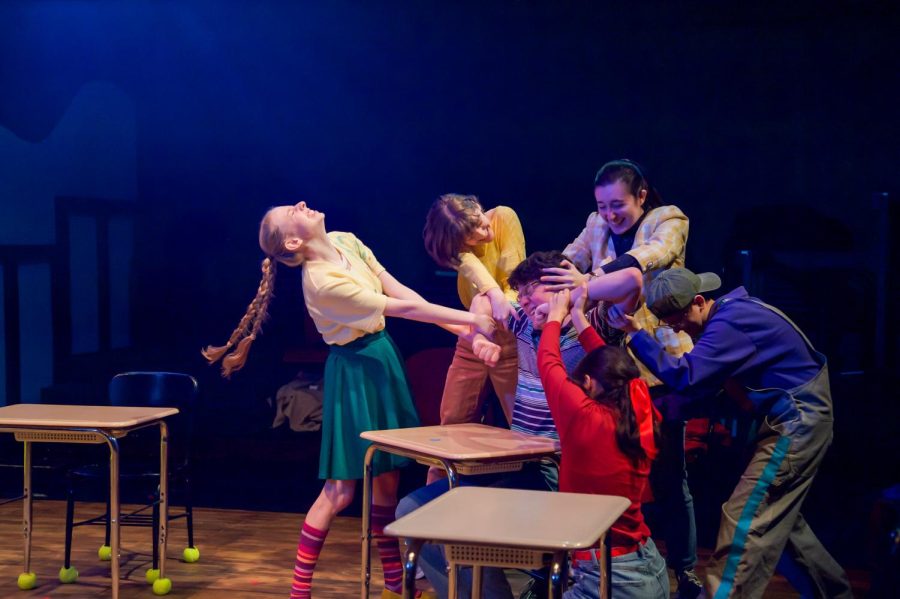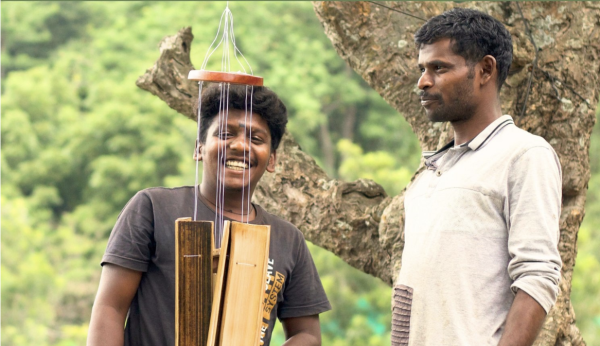Sideways Stories from Wayside School Cast Facilitates Workshop for Community Youth
This weekend, Oberlin College students will perform Sideways Stories from Wayside School at the Kander Theater for an audience of local children. After the performance, based on the book by Louis Sachar, the cast and directors will host a “talk back” in which they will answer questions from the audience and discuss their interest in theater. There will also be a workshop on acting and comedy improvisation for children interested in the performing arts. The production is the capstone project of fourthyear Theater majors Caris Gross and Maggie Elsen.
Gross and Elsen both said they wanted to do something for their final project they had not yet done at Oberlin. They hope to introduce local children to an art form they feel passionate about and give back to the community where they’ve lived for four years.
“I was in a class with Caris last semester, and we had a response post on Blackboard, and Caris mentioned being interested in working with kids,” Elsen said. “I was like, ‘Wait, this is perfect.’”
She approached Gross, and the pair started planning the production. Elsen directed the play, while Gross served as stage manager and community engagement manager.
“I would say a lot of the senior capstone shows are very, very serious because they give the actors and the director a lot of material to work on their acting chops and their directing skills and things like that,” Gross said. “I think those are wonderful shows, and I myself have been part of many of them, … but we wanted to do something that we hadn’t had the opportunity to do at Oberlin before and that we felt could serve a new part of the community that hadn’t been served in recent years by Oberlin College.”
Gross and Elsen chose Sideways Stories from Wayside School because they felt its wacky scenarios and zany humor would be well received by the young audience.
“I felt [even very beloved scripts] were very coddling to kids and were telling them, ‘This is the life lesson in this,’” Elsen said. “I think this show has lessons, but it’s also just kind of silly.”
Sachar wrote Sideways Stories from Wayside School after working as an elementary school teacher’s aide and recess supervisor during college. Due to Sachar’s experiences, the stories are attuned to young children’s acceptance of and delight in absurdity. The set is composed of desks and chairs with feet protected by tennis balls — a setting reminiscent of many of our elementary school experiences — but the scenarios the students face are unexpected and surreal, more similar to our craziest childhood daydreams. In one scenario, an unruly new student, Sammy, arrives dressed in many layers of coats, which when removed reveal that he is a dead rat. In another, Ms. Zarves, the teacher on the nonexistent 19th floor, is summoned when someone suggests she does not exist.
College first-year Ronan Park, who plays several roles, including Sammy, said that a big value of the play’s wackiness was encouraging children’s creativity that is too often stifled as they grow.
“I get to play a lot of really big, silly characters,” Park said. “And part of doing that is connecting to kind of an inner child. … I think, if you start young in theater, you’ll always have a space where you can have some of that silliness and that fun, which I think is really good for you. I think it’s really good to show kids that, even as adults, we can do it.”
As community outreach manager, Gross spent a significant amount of time publicizing the play in the community.
“I have done a lot of work meeting with folks from Oberlin Elementary School; MAD* Factory, which is a youth theater organization in town; … [and] the Girl Scout troops in town, all to get them to come and see our show [and] enjoy what we’re putting together for them,” Gross said.
Gross mentioned that doing theater productions for local children is not something that frequently happens at Oberlin and hopes that the Theater department will build off the connections with local organizations forged during this project.
Gross, who grew up in a “very theater-oriented family,” plans to enter a career in theater education or theater for kids and feels very passionately about the benefit theater can have on children’s development.
“I do think it’s a really good way to allow kids to play, especially in the sense that … there’s more and more pressure for kids to grow up as quickly as possible,” Elsen said.
The first performances will take place this Saturday and Sunday. The presenters ask that Oberlin students and other adults not accompanying children under 12 refrain from attending these performances to save seats for the target audience. Additional performances on March 2, 3, and 4 will be open to the general public











